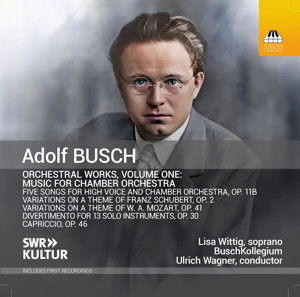
Adolf Busch (1891-1952)
Orchestral Works Volume 1
Divertimento for 13 Solo Instruments, Op 30 (1925)
Variations for Small Orchestra on a Theme of Franz Schubert, Op 2 (1909 orch 1910)
Five Songs for high voice and chamber orchestra, Op 11b (1919-20)
Variations on a Theme of Mozart for Orchestra, Op 41 (1928)
Capriccio for Small Orchestra, Op 46 (1931)
Lisa Wittig (soprano), BuschKollegium/Ulrich Wagner
rec. 2024, Studio 5, SWR, Baden-Baden, Germany (Divertimento); live, July 2022, Kubus, Zentrum für Junst und Medien, Karlsruhe, Germany (others)
Texts in German with English translation
Toccata Classics TOCC0671 [60]
Violinist, quartet and chamber orchestra leader Adolf Busch’s compositional life is slowly being unveiled, and Toccata continues its exploration with volume one of his orchestral works. Whereas I found Busch’s piano works (review) less than gripping – to put it mildly – I find much of Toccata’s latest release considerably more revealing of Busch’s accomplishments.
Rather adroitly, Toccata ensures that things aren’t programmed quite chronologically by starting with the most immediately appealing of the works, the Divertimento for 13 Solo Instruments of 1925, a Weimar-era work of six movements and the only one in the disc to have been recorded before. Stylistically, it’s never always easy to pin down Busch but his Hausmusik is generally classical in shape, and often witty, as here. The lively contrapuntal writing is gleefully conveyed in this performance by the ensemble that takes his name, the BuschKollegium, under Ulrich Wagner. Busch invariably writes well for the clarinet – try the Andante – and has a bubbly sense of humour which in the Scherzo comes close to comic combustion. The Mozartian Serenade-stylishness of the Andante cantabile is followed by a sonata form finale – witty, lyrical and delightful. I think if you have yet to take your Busch compositional plunge, start with this unpretentious, winning Divertimento.
Busch was fond of variation form, possibly something he inherited from Reger. The Schubert variations date from 1909 and were orchestrated the following year. The theme is from the Piano Sonata in A minor, D.537 and the ensuing variations veer from giocoso to whimsical with some metrical interest as well to titillate the ear. There’s (again) some dapper writing for clarinet. It’s a work that stands in the Regerian lineage, certainly, but also as a cousin, twice removed, and with no great aspirations, of Brahms’ Haydn Variations. The other work is the Variations on a Theme of Mozart, dating from 1928. Tovey’s admiring analysis is reprinted in Toccata’s customary full and admirably wide-ranging notes. Crisp and harmonically vivid, this work has a greater quotient of warmth than in the earlier Schubert. The final variation is especially telling as regards Busch’s use of textual and expressive depth.
The Capriccio for Small Orchestra, of which there’s another of Tovey’s analyses to read in the booklet, is probably his most performed work. It’s saying something, though, when one realises that it’s receiving its first recording here. Barely eleven minutes in length, it’s a clean-limbed, clearly laid out and effective work – lucid, and expertly functional. This leaves the Five Songs, well sung by soprano Lisa Wittig, two of which are by Eichendorff, one by Gottfried Keller and two by Japanese poets, Wang-Seng-Yu and Sao-Han. They are largely suffused with a compressed Straussian yearning – only one song exceeds two minutes in length by any distance – without quite achieving Straussian melodic distinction. But valuable to have and to hear.
As noted, four of the five works are heard in first recordings and these four were all made live in concert. It’s a tribute to the ensemble’s quality that it makes such a fine show of Busch’s largely unknown compositions and does so in such good recorded sound as well.
Jonathan Woolf
Buying this recording via a link below generates revenue for MWI, which helps the site remain free.



















